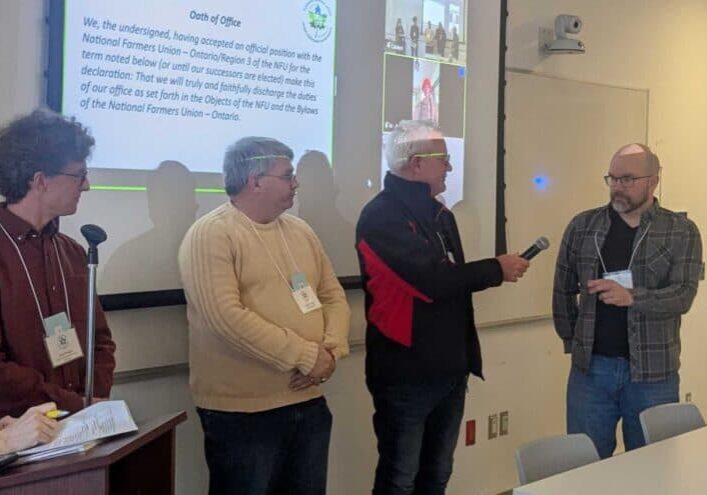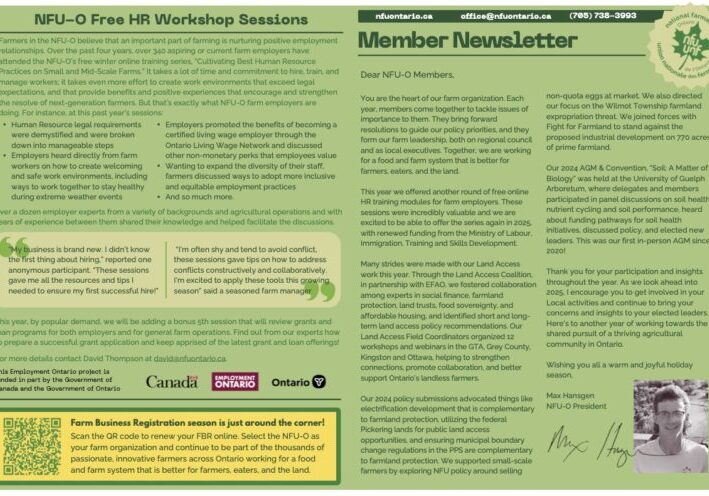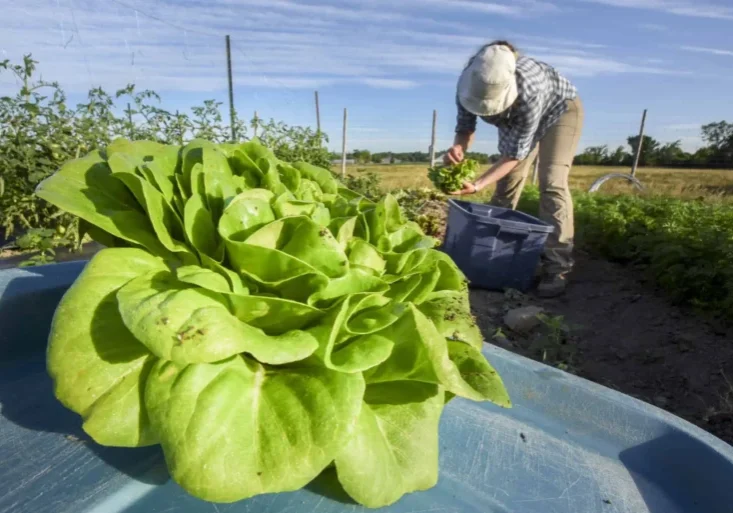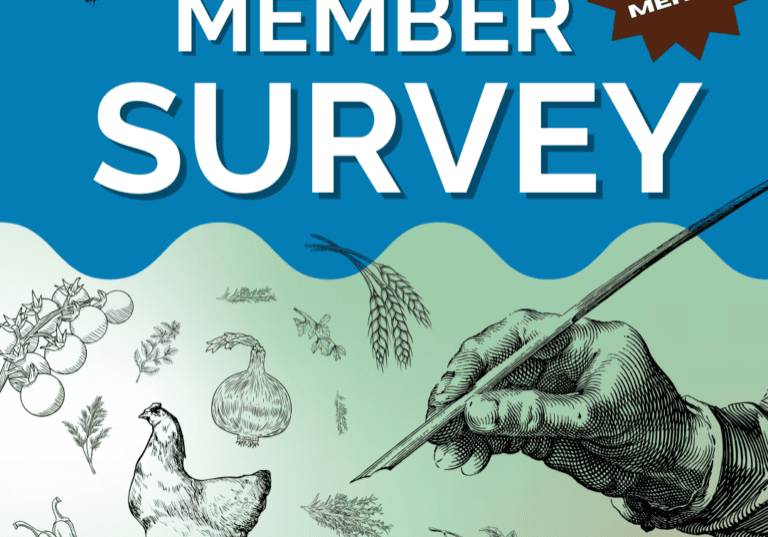Let’s Talk About Improving Nutrient Management
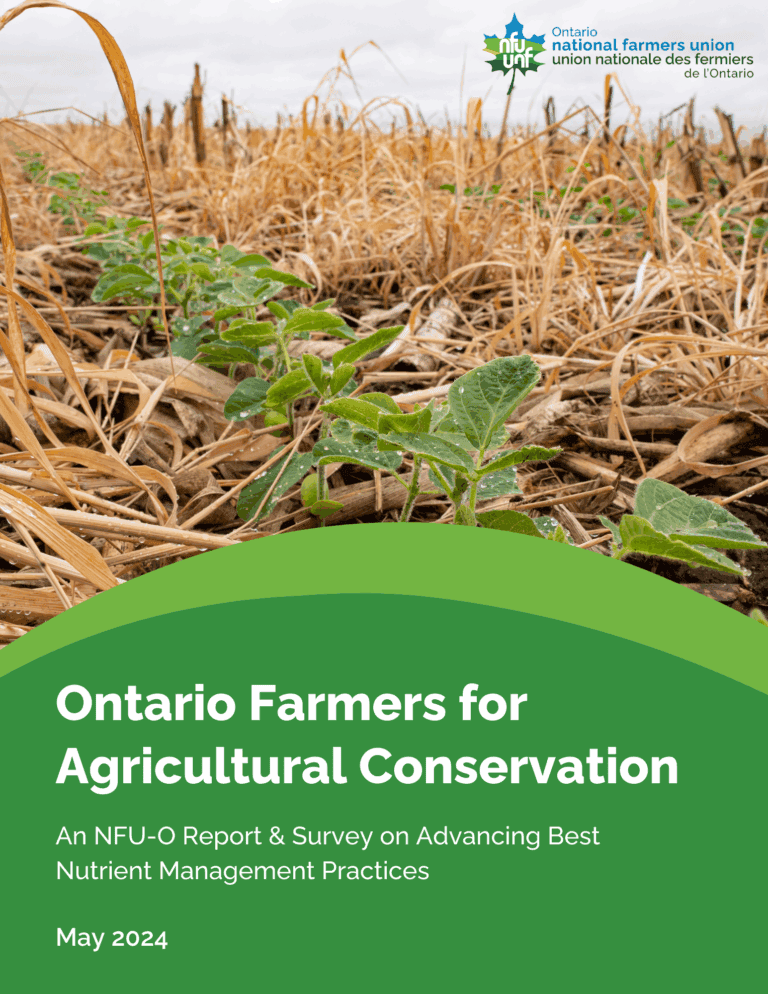
National Farmers Union – Ontario Newsletter
The Rural Voice | June 2024
Farmers care about agricultural conservation. Over three quarters of the 246 Ontario farmers who took part in a recent NFU-O survey believe they have an important role to play in protecting water quality. A majority are also concerned about the rise of toxic Lake Erie algae blooms. Most are very aware that the re-eutrophication of Lake Erie is caused, primarily, by manure and synthetic fertilizers applied in agricultural production.
“We want to be part of the solution,” says Don Ciparis, NFU-O Local 306 president and grain farmer.“We wish to initiate honest and difficult conversations about what we can do as farmers to advance an environmentally-responsible agriculture sector in this province.”
A multi-pronged approach is required to maintain and improve water and soil health. A proactive and accountable farming community has the power to shift the dominant narratives away from denial or inaction. The NFU-O recommends:
The reintroduction of comprehensive Ontario Ministry of Agriculture, Food, and Rural Affairs (OMAFRA) extension services for nutrient guidance including free annual soil testing for all farm operations. Our study found that less than 15 per cent of conventional crop farmers rely on OMAFRA’s nutrient management guidelines and the majority take commercial fertilizer suppliers’ advice at face value.
The creation of a Canadian Farm Resilience Agency (CFRA) to coordinate a rapid, science-guided, and least cost transition to financially secure, emission-minimizing farms and food systems.
Public education campaigns, including free and accessible training on “least cost crop production,” or farming for maximum profit versus maximum yield: Our survey data revealed that crop farmers spend, on average, one-fifth of their input costs on fertilizer. Both the environment and farmers would benefit from education campaigns on practices/methods that reduce the total amounts of fertilizers required to grow their crops.
An increase in public and private grants, subsidies, and cost-share programs: Financial supports, like those currently offered under the Ontario Agricultural Sustainability Initiative, are required to support farmers who make improvements by voluntarily adopting best agricultural conservation practices. These grants and subsidies need to be easy to apply for, equitably administered, and long enough in duration to measure the efficacy of any intervention.
Exploring how agricultural tax and federal program incentives could be made cross-compliant with on-farm agricultural conservation practices: This could include incremental revamping of Agriculture and Agri-Food Canada (AAFC) Business Risk Management programs, in particular AgriInvest, to incentivize farms that enact proven ecological improvements. At the provincial/municipal level, cross- compliance could also include adopting specific agricultural conservation practices a condition for farmers to receive an additional reduction to their current 25 per cent agricultural property tax rate.
Revise the Nutrient Management Act (2002) to include synthetic fertilizer regulations and strengthen compliance measures. Almost half of the farmers surveyed were open to augmenting voluntaristic approaches with specific regulations. These regulations need to make regular soil testing a requirement as it is impossible to adhere to sustainable 4R Nutrient Stewardship without it. These new and revised regulations need adequate compliance, monitoring, and enforcement both to be effective and to gain the public’s trust. Similar regulations have been introduced with considerable success in the United States, Europe, and recently, in British Columbia.
For more information, we invite you to read Ontario Farmers for Agricultural Conservation: An NFU- O Report & Survey on Advancing Best Nutrient Management Practices on the NFU-O website.
A subscription to The Rural Voice is one of the benefits of being an NFU-O member

